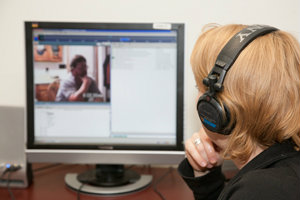How to ace a job interview
How carefully you prepare for face-to-face interviews with a potential employer will likely determine whether the scales tip in your favour, says Susanne Thorup, manager of Concordia’s Career and Placement Services (CAPS).
Counselling and Development is offering two hands-on workshops in March and April – Interviewing Prep and Interview 101: The Art of Communicating Your Skills to an Employer – that outline ways to win over an interviewer.

Before working in career services, Thorup was a recruiter who conducted hundreds of job interviews. So what’s the biggest mistake students are likely to make during interviews? Not having done enough homework about the organizations they target, she says.
“Students need to do some research. For example, what are the major products and services the company offers? What’s the organization’s history and structure? Who are their main competitors? Those are some things students should know going into the interview,” says Thorup.
Preparing answers to basic questions that are likely to be asked during an interview is covered in the workshops through a series of role-playing exercises.
“Students aren’t necessarily prepared to come up with good answers on the spot,” she says. “Employers will often say things like, ‘Describe a stressful situation and how you handled it,’ or ‘Tell me about a particular team project of which you’re particularly proud and describe your contribution.’ Those are hard questions to answer without some preparation.”
Make a list that outlines your accomplishments that you want to convey to an employer, suggests Thorup. Be sure to draw from experiences with classmates on group projects or previous work experience.
“Come up with good examples of your leadership skills, how you’ve dealt with difficult situations and conflicts, and your strengths and weaknesses. If you haven’t thought about examples in advance, you’re not going to do well under pressure,” says Thorup. “You don’t have to over-prepare, but you do need to identify which experiences, skills and accomplishments you want to convey to that employer that demonstrate you are a match for the position. That way, no matter what questions they ask you, you are prepared.”

Practice makes perfect, and the department’s new online interviewing coaching tool – Perfect Interview – lets students answer basic interview questions via a webcam. They can record their answers and then get constructive feedback from a career advisor.
During a job interview, employers are ultimately trying to figure out if you’re going to be a good fit for their organization. Answering questions isn’t enough; students should come into an interview with a list of questions to ask a potential employer, says Thorup. “Ask questions that demonstrate your interest in the organization and how you would be a fit, not questions about salary, location and benefits,” she says.
Don’t forget to dress the part – part of your research should involve finding out what an organization’s corporate culture is like regarding dress, says Thorup. “At our workshops and on our website, we have some great information about specifics such as what is business casual,” she adds. “It’s always better to be overdressed than underdressed for an interview.”
Related links:
• CAPS Database
• List of workshops
• How to prepare for a job interview
• New on-line interviewing coaching/preparation tool, Perfect Interview


